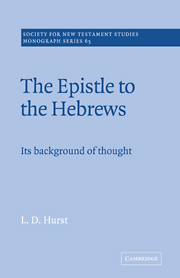Introduction
Published online by Cambridge University Press: 20 November 2009
Summary
Despite its deep severity, there is something faintly humorous about the Epistle to the Hebrews. It claims that it is “written in few words” (13:22); yet before the reader has reached the final chapter it is clear that this is one of the longest letters in the NT. Because of its canonical history the phrase “without father, without mother, without genealogy” (7:3) seems more fitting for the document than for one of its favourite characters. “The Epistle to the Hebrews” is often said to be the most “Greek” book in the Jewish–Christian Bible. Indeed, to some it might seem that the epistle itself is something of a joke – a joke played upon a church obsessed with finding complete certainty about its origins. That the most elementary facts concerning this “final word” on the Christian faith may be arrived at only through a fancy tapestry of guesswork is what punctuates the joke with its required – and exquisite – irony.
When reading modern descriptions of the epistle, it is not uncommon to encounter pejorative expressions which are extraordinary for a document which for centuries had the status of a Pauline writing. “Fantastic,” “amazing,” “artificial,” “obscure,” “outmoded,” “a theological treatise in cold blood,” “sheer length and nothing but length” – these are but a few one could cite from recent interpretation.
How has the epistle come upon such hard days? The answer must involve a brief survey of recent interpretation.
- Type
- Chapter
- Information
- The Epistle to the HebrewsIts Background of Thought, pp. 1 - 4Publisher: Cambridge University PressPrint publication year: 1990



